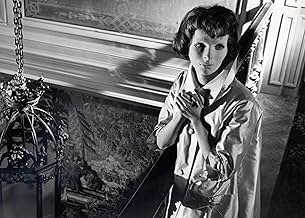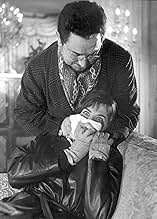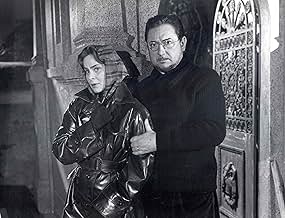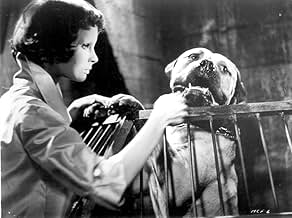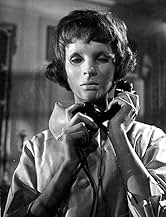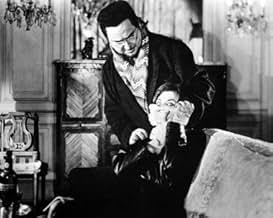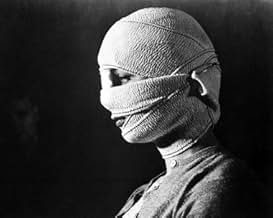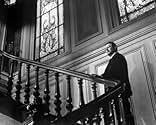AVALIAÇÃO DA IMDb
7,6/10
38 mil
SUA AVALIAÇÃO
Um cirurgião causa um acidente que deixa sua filha desfigurada e fará todo o possível para dar-lhe um novo rosto.Um cirurgião causa um acidente que deixa sua filha desfigurada e fará todo o possível para dar-lhe um novo rosto.Um cirurgião causa um acidente que deixa sua filha desfigurada e fará todo o possível para dar-lhe um novo rosto.
- Direção
- Roteiristas
- Artistas
Charles Blavette
- L'homme de la fourrière
- (cenas deletadas)
- (as Blavette)
Charles Bayard
- Un homme à la conférence
- (não creditado)
Gabrielle Doulcet
- Une admiratrice du docteur Génessier
- (não creditado)
Avaliações em destaque
Though EYES WITHOUT A FACE is indeed a horror film, it is also a dark tragedy. Doctor Genessier (Pierre Brasseur) and his daughter, Christiane (Edith Scob) were involved in a terrible accident, leaving Christiane in the condition suggested by the title. Now, her father is driven to fix what he has done. He is aided by his faithful cohort, Louise (Alida Valli), who lures women to their fate.
Through hideous trial and error, involving several unwary, female "subjects", Genessier is willing to destroy others in order to restore his daughter's beauty. What he really seeks is redemption, and relief from his own feeling of unfathomable guilt. His obsession to restore what he has broken makes him oblivious to all else. For Genessier, the end truly does justify the means.
For her part, Christiane is a virtual prisoner in their enormous house, doomed to wear a doll-like mask, and wander about like a ghost. Not so surprisingly, this all leads to a catastrophic conclusion. This film shocked audiences and inspired a generation of filmmakers. It holds up solidly to this day...
Through hideous trial and error, involving several unwary, female "subjects", Genessier is willing to destroy others in order to restore his daughter's beauty. What he really seeks is redemption, and relief from his own feeling of unfathomable guilt. His obsession to restore what he has broken makes him oblivious to all else. For Genessier, the end truly does justify the means.
For her part, Christiane is a virtual prisoner in their enormous house, doomed to wear a doll-like mask, and wander about like a ghost. Not so surprisingly, this all leads to a catastrophic conclusion. This film shocked audiences and inspired a generation of filmmakers. It holds up solidly to this day...
"Eyes Without A Face" is a groundbreaking and trendsetting artistic nightmare! The plot of this film has often been copied but never has it been done in such an eerily effective style. The sight of the masked daughter playing with the dogs evokes many emotions in the viewer. There are shots in this movie that will stay with you long after you have seen it! Heavily recommended!
Georges Franju's version of a mad scientist trying to play God tells about a brilliant but controlling and obsessive doctor who is trying to restore the face of his own beloved daughter that was horribly disfigured in a car accident caused by his reckless driving. He requires tissues of recently deceased young women that look like his daughter and he is not going to wait for them to die in an accident - he creates the accidents with help of his loyal secretary/nurse/lover/former patient Louise (Alida Valli of "The Third Man") who kidnaps the unsuspecting girls and brings them to the secluded mansion in one of Paris's suburbs where Doctor Génessier is ready to perform the fascinating and horrifying surgeries.
"Eyes without a Face" is a very impressive, classy picture that has inspired many later horror movies. The music by Maurice Jarr adds to the uneasy and creepy atmosphere - it makes you feel like on the never-stopping ominous merry-go-round and you can't get off it.
"Eyes without a Face" is a very impressive, classy picture that has inspired many later horror movies. The music by Maurice Jarr adds to the uneasy and creepy atmosphere - it makes you feel like on the never-stopping ominous merry-go-round and you can't get off it.
Yes, in case you were wondering, Billy Idol's iconic 80s creepy-ballad "Eyes Without a Face" was directly influenced by this film (the haunting female vocals in the chorus are singing "les yeux sans visage", something I never noticed until I googled the lyrics just now). And this isn't just a passing association I'm mentioning for the sake of getting the attention of any 80s music fans out there; it actually relates to why this is such a great creepy-ballad of a film.
"Les yeux sans visage" is only the 2nd feature film of director Georges Franju, but already he showed an absolute mastery of the craft, if not the creation of a whole new genre. This is broadly a horror story, but it's a horror story in the same sense that 2001: A Space Odyssey is a scifi flick. That is, it uses a certain fantasy genre but only as a backdrop to tell a deeper, universal, timeless story about the human condition. In particular, here we focus on the striking contrast between beauty and cruelty. And when I say "cruelty" I don't mean some cartoonish villain with a handlebar mustache cackling as he ties women to railroad tracks. No, here the "cruelty" is scientific, emotionless and in the literal sense of the word: amoral.
Our villain "The Professor" (who doesn't have a handlebar mustache but is sporting a very Satanic goatee) is excellently played by Pierre Brasseur as a man who has no emotions. He has neither malice nor benevolence, even though on the surface we want to interpret his actions as such. We assume there's malice because he abducts and does nasty things to pretty young women for his medical experiments. We assume an ironic wisp of benevolence because these experiments are presumably to save the person closest to him, his daughter. But neither assumption is correct. The Professor is pure, unemotional science ("intellect"). He is intelligence without a heart. Balancing this character wonderfully is his daughter who is at first equally amoral--literally without morals like a newborn child--but with a strong, tender, emotional side ("soul") and an inclination to learn and evolve. What we get is a painful and beautiful contrast between the intellect and the soul.
Which brings me to the soul half of the equation, and this is what elevates this far above and beyond any horror flick I've ever seen. The daughter is played by newcomer Edith Scob who spends half the film hiding behind a mask but whose graceful charms transcend facial expressions. Almost like a ballet dancer, she uses her body gracefully to convey every feeling we need to know. In fact it's her lack of facial expression that forces us to focus on her body language: movement and form instead. Further highlighting this expression of the human form, we get excellent cinematography, lighting, wardrobe (notice how she is dressed like a human doll) and ESPECIALLY the magical soundtrack giving her a themesong that sounds almost like a music box playing a lullaby.
This brings me back to Billy Idol. You thought I forgot. Billy Idol's 1983 "Eyes Without a Face" was a soft, melodic lullaby ballad but with a very menacing edge to the lyrics and instrumentation when the guitars kick in. Just like this film does, it contrasted cruelty against beauty, something which hadn't been explored much in 80s pop music--as well as 50s/60s horror flicks.
I have to admit, the first time I watched this movie I didn't really appreciate it the way I should have, much like the first time I heard Billy Idol's tune on the radio. But maybe this review has given you a head start; if you watch this film, keep this stuff in mind and maybe you'll appreciate it right away. "Les yeux sans visage" is not a horror story nor is it a battle between good vs evil. It's a study of beauty vs cruelty, both presented in the vacuum of amorality. This film defies all genres. I guess you could say you can't quite put a face to it. Ha. Seriously folks, you'll never forget it. (Get it? Never forget a FACE). Ok enough lame puns. I'll just close by mentioning that Edith Scob is gorgeous. Her face is really easy on the eyes.
"Les yeux sans visage" is only the 2nd feature film of director Georges Franju, but already he showed an absolute mastery of the craft, if not the creation of a whole new genre. This is broadly a horror story, but it's a horror story in the same sense that 2001: A Space Odyssey is a scifi flick. That is, it uses a certain fantasy genre but only as a backdrop to tell a deeper, universal, timeless story about the human condition. In particular, here we focus on the striking contrast between beauty and cruelty. And when I say "cruelty" I don't mean some cartoonish villain with a handlebar mustache cackling as he ties women to railroad tracks. No, here the "cruelty" is scientific, emotionless and in the literal sense of the word: amoral.
Our villain "The Professor" (who doesn't have a handlebar mustache but is sporting a very Satanic goatee) is excellently played by Pierre Brasseur as a man who has no emotions. He has neither malice nor benevolence, even though on the surface we want to interpret his actions as such. We assume there's malice because he abducts and does nasty things to pretty young women for his medical experiments. We assume an ironic wisp of benevolence because these experiments are presumably to save the person closest to him, his daughter. But neither assumption is correct. The Professor is pure, unemotional science ("intellect"). He is intelligence without a heart. Balancing this character wonderfully is his daughter who is at first equally amoral--literally without morals like a newborn child--but with a strong, tender, emotional side ("soul") and an inclination to learn and evolve. What we get is a painful and beautiful contrast between the intellect and the soul.
Which brings me to the soul half of the equation, and this is what elevates this far above and beyond any horror flick I've ever seen. The daughter is played by newcomer Edith Scob who spends half the film hiding behind a mask but whose graceful charms transcend facial expressions. Almost like a ballet dancer, she uses her body gracefully to convey every feeling we need to know. In fact it's her lack of facial expression that forces us to focus on her body language: movement and form instead. Further highlighting this expression of the human form, we get excellent cinematography, lighting, wardrobe (notice how she is dressed like a human doll) and ESPECIALLY the magical soundtrack giving her a themesong that sounds almost like a music box playing a lullaby.
This brings me back to Billy Idol. You thought I forgot. Billy Idol's 1983 "Eyes Without a Face" was a soft, melodic lullaby ballad but with a very menacing edge to the lyrics and instrumentation when the guitars kick in. Just like this film does, it contrasted cruelty against beauty, something which hadn't been explored much in 80s pop music--as well as 50s/60s horror flicks.
I have to admit, the first time I watched this movie I didn't really appreciate it the way I should have, much like the first time I heard Billy Idol's tune on the radio. But maybe this review has given you a head start; if you watch this film, keep this stuff in mind and maybe you'll appreciate it right away. "Les yeux sans visage" is not a horror story nor is it a battle between good vs evil. It's a study of beauty vs cruelty, both presented in the vacuum of amorality. This film defies all genres. I guess you could say you can't quite put a face to it. Ha. Seriously folks, you'll never forget it. (Get it? Never forget a FACE). Ok enough lame puns. I'll just close by mentioning that Edith Scob is gorgeous. Her face is really easy on the eyes.
George Franju's "Yeux Sans Visage" is extremely slow yet absolutely riveting. The direction is masterful and Pierre Brasseur is superb as the dedicated doctor whose love for his daughter leads him to commit unspeakable crimes.
The cold, sinister atmosphere of the film will seep into your bones and you may find it hard to look at the screen when the central skin-removal operation takes place - this is an extraordinarily grisly sequence for its time, lent all the more power by the cold, matter-of-fact direction and acting.
In a film full of haunting images, you will find the last one unforgettable.
Why can't modern directors make horror films as good as this? It deals with a potentially lurid, gory subject-matter with masterly subtlety and skill.
The cold, sinister atmosphere of the film will seep into your bones and you may find it hard to look at the screen when the central skin-removal operation takes place - this is an extraordinarily grisly sequence for its time, lent all the more power by the cold, matter-of-fact direction and acting.
In a film full of haunting images, you will find the last one unforgettable.
Why can't modern directors make horror films as good as this? It deals with a potentially lurid, gory subject-matter with masterly subtlety and skill.
Você sabia?
- CuriosidadesDuring the original release of the film in the UK in 1960, an English film critic for "The Spectator" was nearly fired for writing a positive review of it after the general critical reaction to it had been negative.
- Erros de gravaçãoWhen she is not wearing it, Christiane's mask is very thick and heavy and would only seem to cover her face. When she puts it on, however, it is very thin, close-fitting, and seamlessly covers her jawline and the underside of her chin, revealing that the mask itself is a prop while the actress probably wears a combination of makeup and prosthetics.
- Citações
Christiane Génessier: My face frightens me. My mask frightens me even more.
- Versões alternativasThe film's original release in the U.S. in 1962 was dubbed in English, edited and re-titled "The Horror Chamber of Dr. Faustus". The surgery scene was edited for content, while any and all scenes that made Dr. Genessier seem to be sympathetic (particularly the scene where he cares for a sick boy) were cut.
- ConexõesFeatured in Cinéma, de notre temps: Georges Franju, le visionnaire (1996)
Principais escolhas
Faça login para avaliar e ver a lista de recomendações personalizadas
- How long is Eyes Without a Face?Fornecido pela Alexa
Detalhes
Bilheteria
- Faturamento bruto nos EUA e Canadá
- US$ 58.565
- Fim de semana de estreia nos EUA e Canadá
- US$ 19.628
- 2 de nov. de 2003
- Faturamento bruto mundial
- US$ 62.793
- Tempo de duração
- 1 h 30 min(90 min)
- Cor
- Proporção
- 1.66 : 1
Contribua para esta página
Sugerir uma alteração ou adicionar conteúdo ausente

![Assistir a Tráiler [OV]](https://m.media-amazon.com/images/M/MV5BOGQ0MzNjNTYtYTViNC00NjVjLWI2MDEtYTczMzJjMTZlZDUwXkEyXkFqcGdeQXRyYW5zY29kZS13b3JrZmxvdw@@._V1_QL75_UY281_CR0)
